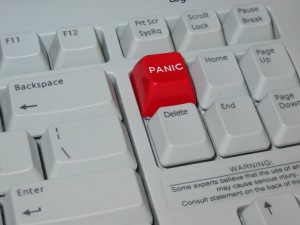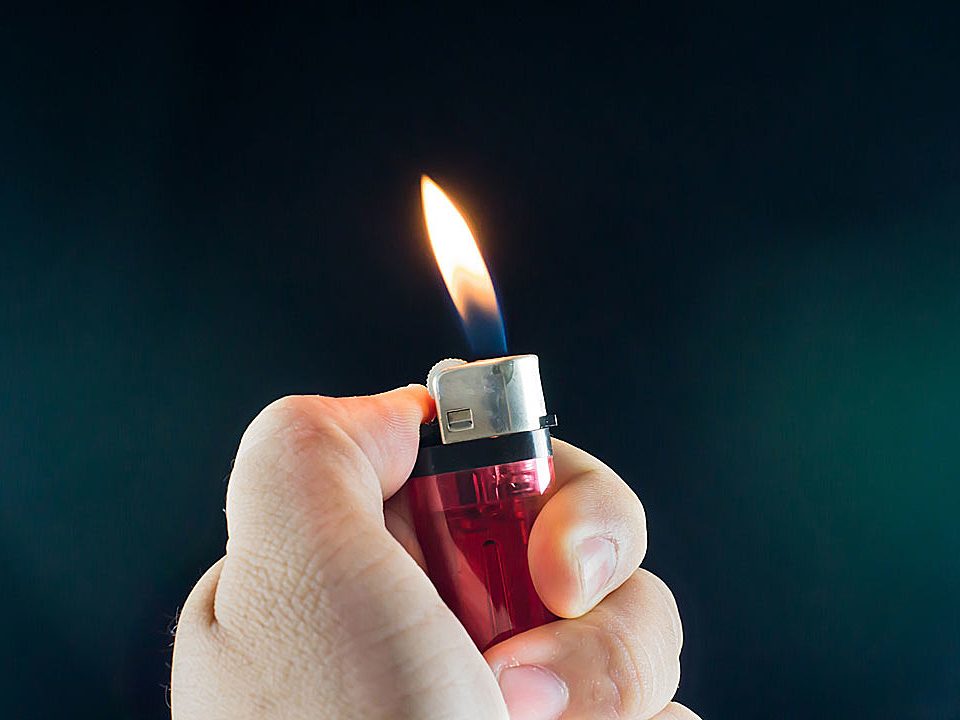The Truth About Panic
The Truth About Panic
 When the recent earthquake and tsunami hit Japan, people in various parts of the world panicked. A week after the earthquake, a Los Angeles Times article reported that there were “long lines and mob scenes at stores across China after rumors spread of a radioactive cloud from Japan’s quake-damaged nuclear plant.” Can you guess what the mobs of people were trying to buy? Iodized salt. They were under the false impression that they would be protected from radiation if they consumed extra iodized salt.
When the recent earthquake and tsunami hit Japan, people in various parts of the world panicked. A week after the earthquake, a Los Angeles Times article reported that there were “long lines and mob scenes at stores across China after rumors spread of a radioactive cloud from Japan’s quake-damaged nuclear plant.” Can you guess what the mobs of people were trying to buy? Iodized salt. They were under the false impression that they would be protected from radiation if they consumed extra iodized salt.
In California, pharmacists reported that they were “flooded” with requests for iodine tablets. It didn’t take long before stores and pharmacies ran out of the tablets because of the panic buying that took place. On eBay, prices for iodine tablets skyrocketed.
A few weeks ago, before the earthquake, I received a phone call from a client who reads my weekly articles. The client is a young, educated, devout Catholic, stay-at-home wife and mother who keeps up with what’s going on in politics and the financial markets. She’s concerned about the rising cost of food and gas and the prospect of steep price increases. She has been following the predictions of several economists who claim that it’s only a matter of time before there will be a spike in inflation (and food prices), because of the massive borrowing that has been taking place by the U.S. government.
A few days after my client called, I read an article about a study conducted by British engineers that expressed concern about the “dangerous over-reliance” on satellite navigation systems such as the Global Positioning System (GPS). One expert, Martyn Thomas, was quoted as saying, “A significant failure of GPS could cause lots of services to fail at the same time, including many that are thought to be completely independent of each other.”
The Global Positioning System, which is comprised of satellites that orbit around the earth, is used for a variety of purposes, such as car and truck navigation systems, routing of commercial aircraft, tracking of deliveries and cargo, financial transactions, and the opening of train doors at stations. Disruptions could take place as a result of a variety of factors, such as technical breakdowns, criminals using small-scale jamming devices, and terrorists or rogue government agents seeking to shut down entire systems.
So what would happen if there was a financial meltdown that caused food and gas prices to triple in a matter of weeks? What if there was a disruption in communications that shut down the Global Positioning System for several days or weeks, causing a halt to all interstate deliveries of food and household goods?
There would be widespread panic. If things didn’t return to normal quickly, the panic could turn into looting and rioting in the streets.
So what is it that causes people to panic so easily? There are three primary reasons people panic so easily and quickly: (1) lack of relevant information and understanding; (2) lack of preparation; and (3) lack of faith.
1. Lack of Relevant Information and Understanding. Based on the information I provided to you last week concerning the nuclear disaster in Japan, there is no way that an informed person in China or California could reasonably believe that the radiation will spread from Japan to China or the United States. It’s understandable that the people of China would not have access to good information, because the Chinese government limits the amount and type of information the people have available to them. As far as California is concerned, my assumption is that the people in California who “flooded” the pharmacies did so based upon the misleading information that was dished out to them by the local and national media.
2. Lack of Preparation. If the people of China and California had prepared ahead of time for possible exposure to dangerous levels of radiation, there would not have been any reason to panic. The first thing that needs to be done to prepare for exposure to radioactive fallout is to have 130 mg potassium iodine tablets on hand. The most vulnerable organ in the body (to radiation) is the thyroid gland, which absorbs iodine like a dry sponge absorbs water. Since radioactive iodine is released during a nuclear meltdown, a person needs be able to quickly “pre-fill” the thyroid with non radioactive iodine so that the thyroid will be too full to absorb the radioactive iodine. (For more information about the type of iodine tablets you should buy and how you can further prepare for a nuclear disaster, see Preparing For Nuclear Fallout, by Jon Barron.)
3. Lack of Faith. There is a certain confidence and calmness that comes with total faith in God that helps to control the emotions and keep a person from panicking. But when I mention “lack of faith,” I’m not just talking about faith in God. I’m also talking about faith in yourself and your own ability to effectively and confidently deal with a crisis. When a person has the knowledge and understanding needed to handle a potentially disastrous event, and has properly prepared for the event, then the person is more at ease and able to manage any negative emotions that would ordinarily cause a person to panic.
I ended up recommending to the young mother that she accumulate and store at least a month’s supply of food and water. I told her that as long as the food is rotated on a regular basis, she doesn’t need to be concerned about buying freeze dried or vacuum packed food products. I also suggested that she store the normal food that her family is accustomed to eating.
When she called, the young mother had already acquired the information she needed and had a full understanding of the likelihood of an event that could cause a severe spike in prices or a disruption in the food supply. She was already thinking about preparing for such an event. By the time she hung up the phone, she had a clear plan to follow. Assuming she follows through on storing (and rotating) enough food and water to feed her family, she will have met the three requirements that I outlined above for avoiding panic.
So here are a few questions for you: Do you have more faith in the government, technology, and “the financial system” than you do in God (and yourself)? Are you an informed individual who has a full understanding of the potential for disruptions in the future? Are you prepared for those disruptions?
I’ve already ordered the iodine tablets I’ll need to protect my family in the event a Nuclear Plant in Illinois has a meltdown. The cost was less than $18. When the tablets arrive by UPS, they’ll be put away in a cabinet and probably never used. But just in case an event occurs, I’ll be able to avoid the inevitable panic that follows.
And yes, I’m preparing for a potential disruption in the food supply, as well as the possibility of a financial meltdown. Neither one of those events may happen, but I’d prefer to have a full understanding of what could happen and then make sure I’m prepared so I don’t panic along with everyone else when the time comes.
Oh, I almost forgot to mention the one final earthly event that none of us has the ability (or resources) to control or avoid. The event I’m talking about is death. We all know with certainty that this event will occur. We just don’t know when. It’s important for us to prepare for this event right now so that our souls will end up in the right “place.” If we don’t prepare for this particular future event, we will end up being in a state of panic and terror for all eternity.
Since we have no idea when we are going to breathe our last breath, we have to constantly be prepared for it. Monthly. Weekly. Daily. Hourly. What are you doing right now to prepare for that event?




1 Comment
Harry, thank you, once again! You’ve put vital information before those of us who read your weekly reports! In our CSJ Community [our Motherhouse is in St. Louis. We have 4 Provinces: NY, CA, MN & SL.] We have shared lists of Preparation Materials to keep, in case of any catestrophic happenings. Just didn’t have a mention of Iodine tablets!!
I am delighted each week with your offerings!
Blessings! Sister Roberta